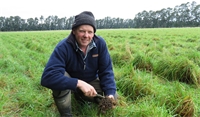Carbon calculator helps farmers assess carbon footprint
A new carbon calculator will be an invaluable tool for helping farmers to run their operations in a more sustainable manner.
Developed by Lincoln University’s Agribusiness and Economics Research Unit (AERU) and engineering consultancy Agrilink, the calculator offers farmers a quick method for assessing their carbon footprint and discovering how their activities could be affecting the planet.
Around 98% of New Zealand farmers are not aware of their farms’ greenhouse gas emissions, and with the country discussing the possibility of implementing a zero carbon target, farmers face concerns about how this may affect them.
The calculator allows them to discover their impacts and supports them to make better choices, for their farms and the country, as they increase their efforts to run their operations more sustainably.
Carbon can be a very abstract concept, so the tool compares the impact of farm emissions to the environmental effect of long-haul flights between New Zealand and London, the distance travelled in a car, or the area that could be planted to offset their emissions.
It uses details such as farm size, stock number, fertiliser and fuel use to calculate methane and nitrous oxide emissions.
The results appear as total CO2 equivalents.
Meridian Energy and Westpac NZ have provided financial assistance towards the development of the new product.
The greenhouse gas calculator was originally developed in 2008 to better inform the Food Miles debate.
It has now been updated to give farmers a quick approximation of their carbon footprint and is not intended to replace detailed greenhouse gas modelling tools.
AERU, established in 1962, has a core mission of exercising leadership in research for sustainable well-being. It operates as a semi-autonomous research centre at Lincoln University and provides research expertise to a wide range of regional, national and international organisations in the public and private sectors.
AERU’s research focuses on economic, resource, environmental and social issues. It employs its own research staff and coordinates some of the external research of academic staff from other Lincoln University faculties.
The new carbon calculator is available at www.lincoln.ac.nz/carboncalculator
Related

Although it’s early days, Mid Canterbury farmers Johnny and Jane Harrison’s decision to integrate ...
Read More

Dairy farmers weighing up a move into share farming next season should take time to know their numbe...
Read More

While humbled to travel the globe being the voice for New Zealand’s agricultural sector, as Hamish ...
Read More

With primary industries crying out for more skilled young people, the Growing Future Farmers program...
Read More

The end of the road is where Colin Drummond and Erin Cassie share their undeterred passion for their...
Read More

From an under-resourced dryland sheep farm to a highly productive mixed cropping operation, Valetta ...
Read More